update 30.
from ferenji frenzy to calm and kindness
Cycling in northern Ethiopia & Sudan
16 December 2008
Total kilometers cycled: 45,904
Specific country info on routes & roads/food & accommodation/the locals available here.
As I struggle up another impossibly steep hill, throngs of crazed children suffering from 'ferenji frenzy' run alongside shouting 'You, You, You!', "where are ye go?' and 'give money!'. Passing villagers greet me in standard Ethiopian fashion, which isn't a wave, but a grimy out-stretched palm demanding hand-outs. Mischievous school-boys and unruly herd boys hurl stones and sticks as I pedal past. Rambunctious groups of girls grab onto my bike and slap me hard on the back as I make my way down a rough track. Welcome to Ethiopia: every cyclist's nightmare.Although most people in towns treat us with respect and kindness, I am appalled, perplexed and outraged by the way we are treated in rural areas. I can find no explanation for the hostile welcome we receive. Why do so many Ethiopians see foreign cyclists not as fellow human beings, but as mobile ATMs? Poverty just doesn't explain rudeness and aggression.
The constant hassles and humiliations we endured drained us emotionally as much as Ethiopia's endless mountains drained us physically. Fortunately, Ethiopia has much to offer in other aspects. The people are beautiful and fascinating. Women and children wear clunky metal crucifixes and wrap themselves up tight in heavy blankets to keep out the cold. Men and boys are never without a long wooden staff, used for herding cows and goats and hassling the odd passing cyclist. The vegetarian food is excellent. Although the local staple, injera, is referred to by many tourists in conjunction with a strong invective(as in f****** injera) we find it tasty and filling. The landscape is stunning. And the (rare) encounters with locals that didn't end in requests for money really boosted morale.

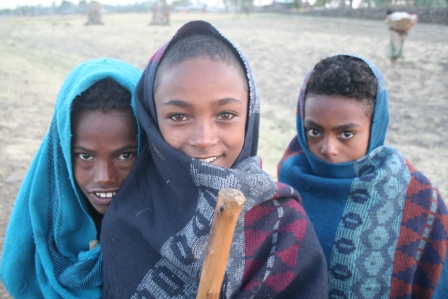
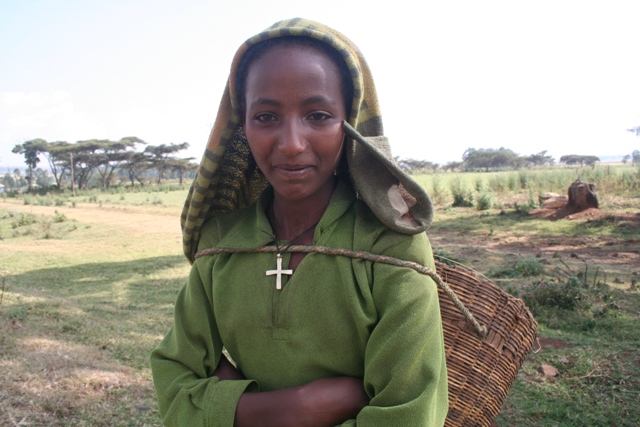
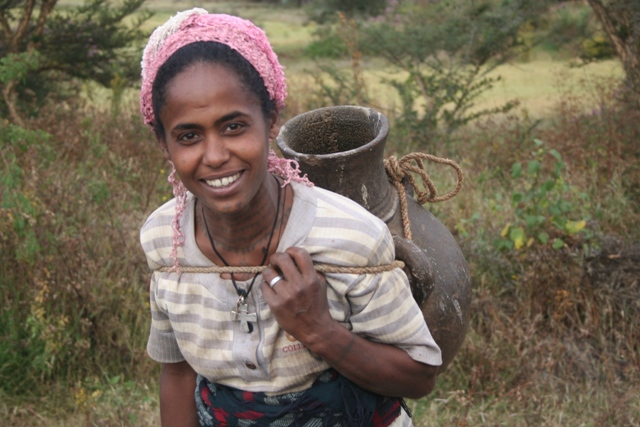
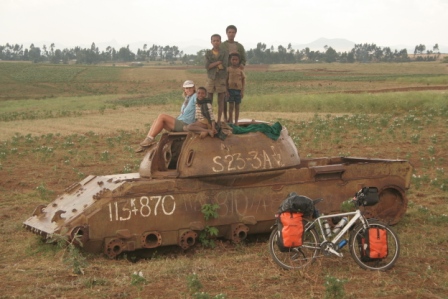
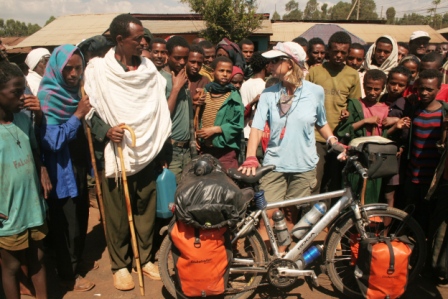
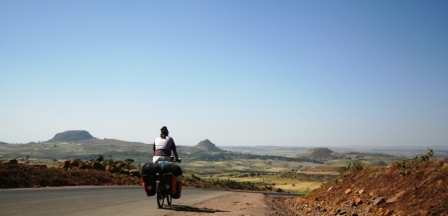
But we were sure glad to leave the chaos and clogged roads of Ethiopia and cross the border into the calm and quiet of Sudan. As we cycled away from the Sudanese border post I endured my final "you, you,you", and shouted back in retaliation, "YOU! Go back to Ethiopia!"
In Sudan the locals smile and greet us with a welcoming 'Salaam'. They are all familiar with the friendly international wave and upturned palms are conspicuously absent from their customs. The men are mostly dressed in the long, white flowing robes called jalabia and the women wear the colorful tobe, a strip of bright cloth draped artfully over the shoulders and covering their entire bodies.
Sudanese hospitality is amazing. After 40 kilometers of riding through the flat and featureless terrain, we stopped at a rickety roadside restaurant for a rest and a bite to eat. A young man insisted on buying us ice-cold cokes. As evening approached we rode into a small, dusty town and went to the police compound with a view to camping. The officers all gathered round to greet and welcome us warmly and later brought Eric a juicy slab of lamb for dinner.
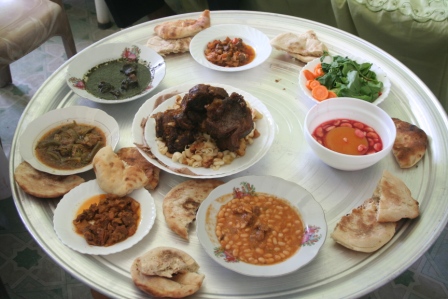
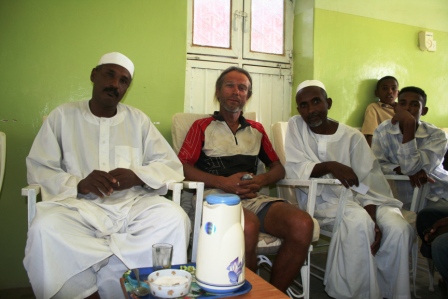
The next day as we continued our journey towards Khartoum, we turned off the busy road looking for a shop that sold cold drinks, and ended up being invited to a wedding feast. We were treated like royalty and all the guests came to shake hands and wish us well. A few of the men spoke excellent English and we were able to communicate easily. They even complimented me on what excellent English I spoke for a Frenchwoman (I had decided claiming French nationality might be more prudent). We even chatted about politics and world affairs and they lamented Sudan's isolation and tarnished reputation within the international community. They appeared genuinely sad to see us go and would no doubt have been thrilled if we had taken them up on their offer to spend the night and take part in the rest of the festivities, when the women joined the men for more feasting and folk music.
It wasn't long before we had our next encounter with Sudanese kindness. Again looking for a spot to pitch the tent, we inquired at the Ministry of Roads compound near Wad Medani if we might spend the night there. Of course we were welcome, but they wouldn't hear of us sleeping in the tent. We were given a comfortable room and access to a shower.
And so the hospitality continued all the way to Khartoum. People honk and wave. Some drive alongside and offer us snacks or invite us home for a meal. Our faith in the basic goodness of man has been restored.
The worst part of travel in Sudan is the prolific roadkill. The stench of putrefying dogs, goats, camels and cows is so overpowering that I am left gagging and retching many times daily. Near the capital, buses and lorries rush by at break-neck speed. The road is narrow without a proper and shoulder and I am thankful that neither of us has ended up squashed under the wheels of a vehicle.
The banks of the Nile have been home for the past few days and we are thoroughly enjoying camping at the Blue Nile Sailing Club in central Khartoum. The city is surprisingly clean, modern and green. This morning cycling back from the bakery where I had picked up hot rolls for breakfast, I was pulled over by a motorcycle cop. He spoke to me in a barrage of Arabic, interspersed with a few key words in English: one-way, 100 pounds(about $50). I was in trouble and entirely guilty of the offense of which I was accused--riding the wrong way down a one-way street. I put on my most contrite expression, hung my head in shame and opened up my small coin purse to reveal its measly contents: one pound.
He sighed, shook his head in what I imagine was exasperation and rode off without another word. I was grateful and relieved.
The vast Nubian desert awaits us when we leave the comfort of Khartoum. We are looking forward to cool nights camping under the star-filled sky, and long, hot days under the scorching sun fighting the persistent headwind that has been keeping us company since we left Ethiopia. The 31st we will catch the ferry to Egypt and ring in the New Year gazing at the pyramids of Abu Simbel from aboard the boat. Our Africa adventure is nearing its end.
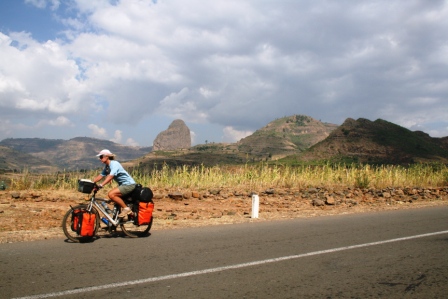
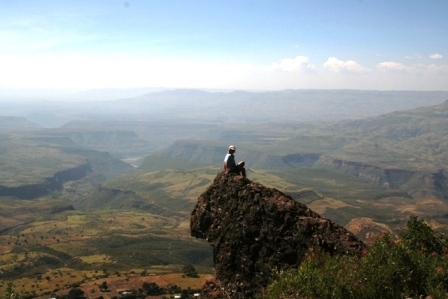
contact us at: worldbiking@gmail.com
Support our chosen charity and help educate girls in Africa-more info here

